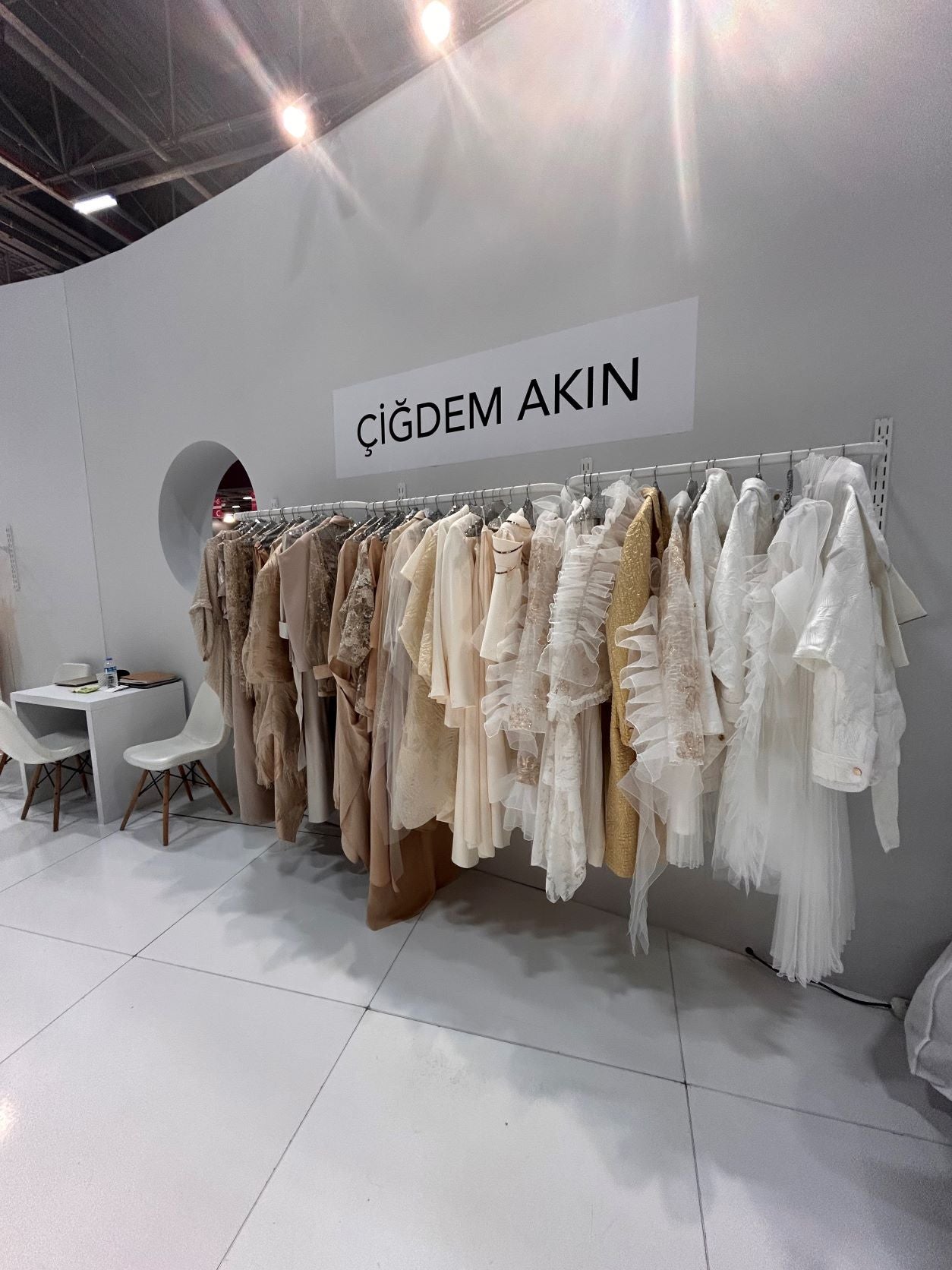
While Istanbul is some 11 hours away by car from the earthquake’s epicentre, simply knowing you are in Türkiye, a country that has had ten cities wiped out a day earlier is unnerving. Naturally, for the majority of Turkish companies at the event, it wasn’t easy to conduct business as usual.
Pretty much all domestic flights were cancelled or running on reduced operations as the focus was removing survivors from earthquake-hit zones while schools and academic institutes were closed, and celebratory events cancelled in line with the national mourning period.
Black ribbons were donned at the event in solidarity of those most impacted by the tragedy. IFCO’s organisers went above and beyond to ensure buyers – at least 2,000 of whom had already landed in Istanbul the day before – were still able to meet with suppliers and export organisations.
Though Istanbul is mostly populated by apparel production facilities, many are reliant on domestic fabric imports from the Hatay and Malatya regions, while Gaziantep houses many leather shoe factories.
Meanwhile Better Cotton says its Farmers and Programme Partners are among the victims, and many members – including ginners, spinners and traders – are based in the affected areas. The Fair Labour Association notes the affected region is host to a number of textile and garment factories that are suppliers of international brands, including some FLA member companies.
The devastation comes at a time when many Turkish garment manufacturers are looking to ramp up their sourcing of raw materials from domestic makers in a bid to showcase the strengths of the country as a producer. The Turkish denim sector, for example, predominantly relies on cotton grown within the country which is then spun into fabric – in the country – then made into denim jeans and jackets – in the same country.

US Tariffs are shifting - will you react or anticipate?
Don’t let policy changes catch you off guard. Stay proactive with real-time data and expert analysis.
By GlobalDataMany suppliers I spoke with at the event explained this full-circle, localised production approach, allows them to gain an overview of the entire apparel supply chain at a time when traceability is becoming paramount. It also appeals to international buyers as it means Türkiye’s garment makers aren’t hanging about waiting on raw materials to finish then shipping goods at a time when speed-to-market is essential.
Over 70% of Türkiye’s apparel exports are destined for the EU and the country is doubling down on its focus to penetrate the US market further. Moreover, its textiles sector is the third largest export for the country after automotive and agriculture.
From what I’ve witnessed over the last week, the Turkish textile sector has the ability to be something truly great. The high-quality of fabrics, the attention to detail on garment finishes, the focus on sustainable production and digitalisation, and, particularly for Europe, the ideal geographical positioning which means it can deliver in a fraction of the time it would take to bring in goods from China, Vietnam or Bangladesh.
What’s needed now is its imminent recovery and international support. It’s crucial that buyers work with apparel factories to understand the impact of the earthquake on their operations and offer support where needed. Monetary support is, of course, key at this point and more steps like those taken by the likes of Inditex, Kering and M&S, are needed. The faster the earthquake-hit zones are able to recover and rebuild, the faster the country’s textile industry is able to realise its true potential on a global scale.
Industry rallies despite sombre mood at Türkiye’s IFCO sourcing show
A sombre mood has enveloped the 3rd IFCO sourcing exhibition in Istanbul following this week’s fatal earthquakes, but the industry is pulling together to showcase what Türkiye, as an apparel supplier, can offer.
Türkiye appeals for donations as earthquakes close Iskenderun shipping port
Türkiye’s apparel sector is appealing for donations, including clothing, to help the relief effort after two major earthquakes struck the country yesterday, resulting in over 5,000 deaths and the closure of a major shipping port.
Türkiye earthquakes – how is the fashion supply chain impacted?
Türkiye, a major fashion sourcing destination for global brands and retailers, has experienced two 7+ magnitude earthquakes today (6 February) as the Istanbul Apparel Exporters Association (IHKIB) tells Just Style exclusively it is trying to determine the potential “effects” on the apparel sector.
Key trends to watch as US apparel imports hit record high in 2022 but slow in 2023
Dr Sheng Lu reveals the main US apparel import patterns of 2022 and the critical issues to watch in 2023 based on the latest trade data released by the Office of Textiles and Apparel (OTEXA) and the US International Trade Commission (USITC).
In other news…
Apparel retailers cancel, delay orders amid economic slump
Bangladesh unions demand wage board and increase for garment workers
Standard Convergence Initiative (SCI) calls for reduction of audit fatigue
Fashion brands urged to talk to suppliers amid ongoing challenges





